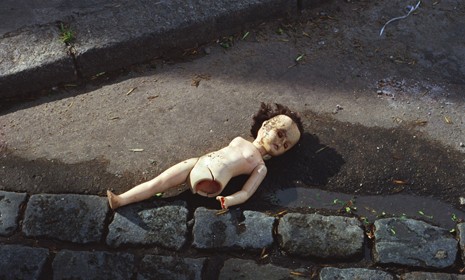America's 'shameful' child abuse problem: 5 theories
In the last decade, more than 20,000 kids have reportedly died because of neglect and abuse — almost quadruple the number of U.S. soldiers killed in Iraq and Afghanistan

A free daily email with the biggest news stories of the day – and the best features from TheWeek.com
You are now subscribed
Your newsletter sign-up was successful
America has a shocking, "shameful" record when it comes to child abuse, according to a report from Every Child Matters, a nonprofit organization that focuses on child welfare. Michael Petit, the organization's president, says at BBC News that more than 20,000 American children are believed to have been killed in their own homes as a result of poverty, malnourishment, neglect, and abuse over the last 10 years. That gives the U.S. the worst rate of child abuse of any industrialized nation — triple that of Canada and 11 times that of Italy. Why is this happening? Here, five theories:
1. The U.S. is rife with social problems
"Part of the answer," Petit says, "is that teen pregnancy, high-school dropout, violent crime, imprisonment, and poverty — factors associated with abuse and neglect — are generally much higher in the U.S." than they are in other parts of the world. And the bottom line is that poor, young, uneducated parents are more likely than other moms and dads to mistreat their kids.
The Week
Escape your echo chamber. Get the facts behind the news, plus analysis from multiple perspectives.

Sign up for The Week's Free Newsletters
From our morning news briefing to a weekly Good News Newsletter, get the best of The Week delivered directly to your inbox.
From our morning news briefing to a weekly Good News Newsletter, get the best of The Week delivered directly to your inbox.
2. American families stick together even when they shouldn't
The American justice system "mistakenly work[s] to preserve the family unit, even where felony child abuse has occurred," says Randy Burton, a former prosecutor in Texas' Harris County District Attorney's office, as quoted by Your Bellaire News. Yes, say Noel Brinkerhoff and David Wallechinsky at AllGov. "The well-intended, but often tragic emphasis in the United States on keeping families together even if a child may be in danger" could well be part of the problem. Sometimes a child is actually safer if his parents split up, and violence is thus taken out of the equation.
3. States aren't offering enough social services
Child abuse is worse in states where the government is less involved in children's lives. For instance, children in Texas "are four times more likely to be uninsured, four times more likely to be incarcerated, and nearly twice as likely to die from abuse and neglect" as children in Vermont, says Petit. Maybe that has something to do with Texas being a "low tax, low service state." Vermont, on the other hand, has high taxes and a much richer array of social services. "Further," Petit says, "other rich nations have social policies that provide child care, universal health insurance, preschool, parental leave, and visiting nurses to virtually all in need." And their rates of abuse are much lower than America's.
A free daily email with the biggest news stories of the day – and the best features from TheWeek.com
4. The system is completely broken
"Hundreds [of] children fall through the cracks of the child protection system," says Pakistan's The Nation. "Some blame overworked investigators and inefficient management." But perhaps the justice system simply "fail[s] to treat child abuse as the crime that it is," says Burton. As a result, "the same abused children continue to recycle through the system."
5. The feds have failed to step in
"A national strategy, led by our national government, needs to be developed and implemented," says Petit. "For a start, the Congress should adopt legislation that would create a National Commission to End Child Abuse and Neglect Fatalities." Even with all our budget woes, children's services should not be cut. "Children did not crash the U.S. economy," and "it is both shortsighted economic policy and morally wrong to make them pay the price for fixing it."
-
 Mixing up mixology: The year ahead in cocktail and bar trends
Mixing up mixology: The year ahead in cocktail and bar trendsthe week recommends It’s hojicha vs. matcha, plus a whole lot more
-
 Labor secretary’s husband barred amid assault probe
Labor secretary’s husband barred amid assault probeSpeed Read Shawn DeRemer, the husband of Labor Secretary Lori Chavez-DeRemer, has been accused of sexual assault
-
 Trump touts pledges at 1st Board of Peace meeting
Trump touts pledges at 1st Board of Peace meetingSpeed Read At the inaugural meeting, the president announced nine countries have agreed to pledge a combined $7 billion for a Gaza relief package